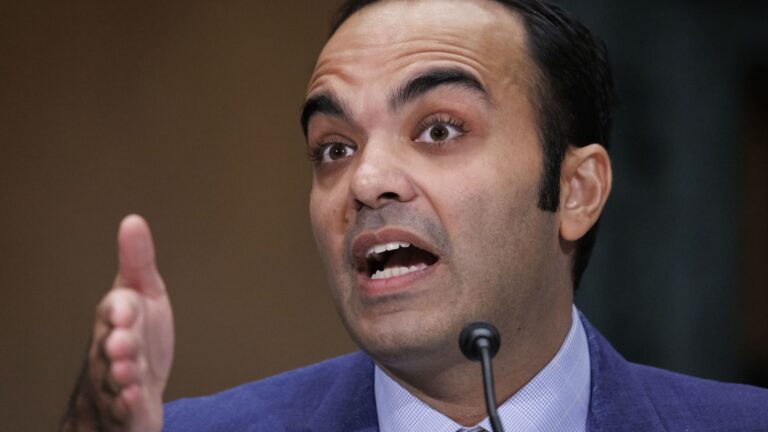At a pivotal Senate Banking, Housing and City Affairs Committee listening to held on December 15, 2022, in Washington, DC, Client Monetary Safety Bureau (CFPB) Director Rohit Chopra solid a major highlight on the bureau’s objectives and achievements.
Photograph Credit score: Shen Ting | Bloomberg | Getty Photographs
In a notable improvement, the U.S. banking sector has emerged triumphant in its efforts to halt the enactment of a pivotal Client Monetary Safety Bureau (CFPB) directive designed to curtail the charges bank card corporations can levy for late funds.
This determination got here to fruition late Friday when a federal courtroom accepted the business’s last-ditch authorized maneuver to droop the enforcement of a rule launched in March, slated to take impact the next Tuesday.
Mark Pittman, a Choose within the Northern District of Texas, dominated in favor of the plaintiffs, which included the U.S. Chamber of Commerce, of their authorized battle in opposition to the CFPB. His judgment highlighted that the plaintiffs efficiently demonstrated the need for a preliminary injunction to freeze the rule.
Quickly, no less than, this verdict safeguards a vital revenue stream for the U.S. bank card sector. The CFPB had projected that the implementation of this rule would lead to an annual saving of $10 billion for American households which might be delinquent on their funds. By decreasing late charges, usually pegged at $32 per incident, to $8 per incident, the rule aimed to restrict the bank card business’s capability to escalate charges.
The way forward for these new laws stays unsure at this level.
“Ought to there be a delay within the rule’s implementation, shoppers will discover themselves accountable for $800 million in late expenses every month, funds that might as a substitute bolster the revenue margins of the most important bank card issuers,” a CFPB spokesperson knowledgeable CNBC on Friday.
The lawsuit from the business seeks to hinder a coverage “that may perpetuate the era of tens of billions of {dollars} in income via the imposition of late charges that significantly surpass their precise prices,” in accordance with a spokesperson.
In keeping with the CFPB, over the previous decade, the business has reaped substantial income by imposing elevated late charges on debtors with decrease credit score scores. Conversely, commerce teams have contested, arguing that the payment cap represents an ill-conceived try to redistribute prices to those that handle to pay their payments punctually.
The Client Bankers Affiliation, a key plaintiff within the lawsuit in opposition to the CFPB, acknowledged, “We’re gratified by the district courtroom’s determination to grant a preliminary injunction, stopping the approaching software of the CFPB’s bank card late payment regulation.”
The CBA has vowed to persist in its authorized problem to elucidate why the CFPB’s guidelines warrant full revocation.
